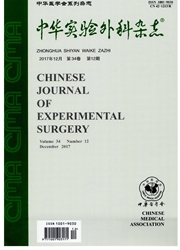

 中文摘要:
中文摘要:
目的探讨错配修复基因hMLH1、hMSH2、hMSH3在膀胱移行细胞癌中启动子甲基化和蛋白表达的相关性。方法采用甲基化特异聚合酶链反应(MSP)检测正常膀胱上皮组织(13例)及膀胱移行细胞癌组织(57例)hMLH1、hMSH2、hMSH3启动子甲基化状态,免疫组织化学检测其蛋白表达。结果在正常膀胱上皮中,hMLH1、hMSH2、hMSH3均未发现启动子甲基化;在肿瘤组织中,hMSH2未发现启动子甲基化,hMLH1、hMSH3启动子甲基化阳性率分别为36.8%、49.1%,与正常组织比较差异均有统计学意义(P〈0.01),但在不同肿瘤分级(G1、G2、G3)间及不同临床分期(浅表性、浸润性)间比较差异无统计学意义(P〉0.05)。免疫组织化学显示:hMLH1、hMSH2、hMSH3蛋白表达在正常膀胱上皮组织中,阳性表达率分别为100%、100%、92.3%,与肿瘤组织阳性表达率分别为59.6%、52.6%、40.4%,两者比较差异有统计学意义(P〈0.01),但在不同临床分期(浅表性、浸润性)间比较差异无统计学意义(P〉0.05),且hMSH2、hMSH3蛋白阳性表达率随肿瘤分级的增加显著降低,G1与G3比较差异有统计学意义(P〈0.05)。在肿瘤组织中,hMLH1和hMSH3启动子甲基化与蛋白表达具有极显著相关性(P〈0.01)。结论hMLH1、hMSH3蛋白表达受其启动子甲基化的调控,hMSH2蛋白表达不受其启动子甲基化的调控。错配修复基因hMLH1、hMSH2、hMSH3蛋白表达的缺失可能参与了膀胱移行细胞癌的发生。
 英文摘要:
英文摘要:
Objective To investigate the correlation between Promoter methylation and the expressions of mismatch repair gene hMLH1 ,hMSH2,hMSH3 in transitional cell carcinoma of the bladder( TCCB). Methods In 13 cases of normal epithelial tissues of the bladder and 57 cases tissues of TCCB,the Promoter methylation status of hMLH1, hMSH2, hMSH3 was examined by means of methylation-specific PCR. Immunohistochemieal staining was applied to detect the expression of hMLH1 ,hMSH2,hMSH3 genes. Results Promoter methylation of hMLH1 ,hMSH2 and hMSH3 was not identified in the normal tissues. Promoter methylation of hMSH2 was not identified in TCCB tissues. Promoter methylation of hMLH1 and hMSH3 was present in 36.8% and 49.1% of TCCB tissues respectively. There was significant difference between the normal tissues and TCCB tissues respectively (P 〈0.01 ). But significant difference was not found in TCCB in regard to different histological grade and clinical stage ( P 〉 0.05). The positive protein expression rate of hMLH1 ,hMSH2 and hMSH3 was 100% ,100% and 92.3% in the normal tissues respectively,while the positive expression rate was 59.6% ,52.6% and 40.4% in TCCB respectively,which was significantly different between the normal tissues and TCCB tissues respectively ( P 〈 0.01 ). However there was no significant difference in TCCB at different clinical stage (P 〉 0.05 ). The positive expression of hMSH2 and hMSH3 was negatively correlated to tumor grades. Promoter methylation of hMLH1 and hMSH3 genes inhibits the protein expressions of hMLH1 and hMSH3 in TCCB ( P 〈 0.01 ). Conclusion The reduced protein expression of hMLH1 and hMSH3 was regulated by Promoter hypermethylation, except for the expression of hMSH2. The reduced expression of hMLH1 ,hMSH2 and hMSH3 might play an important role in carcinogenesis of TCCB.
 同期刊论文项目
同期刊论文项目
 同项目期刊论文
同项目期刊论文
 期刊信息
期刊信息
